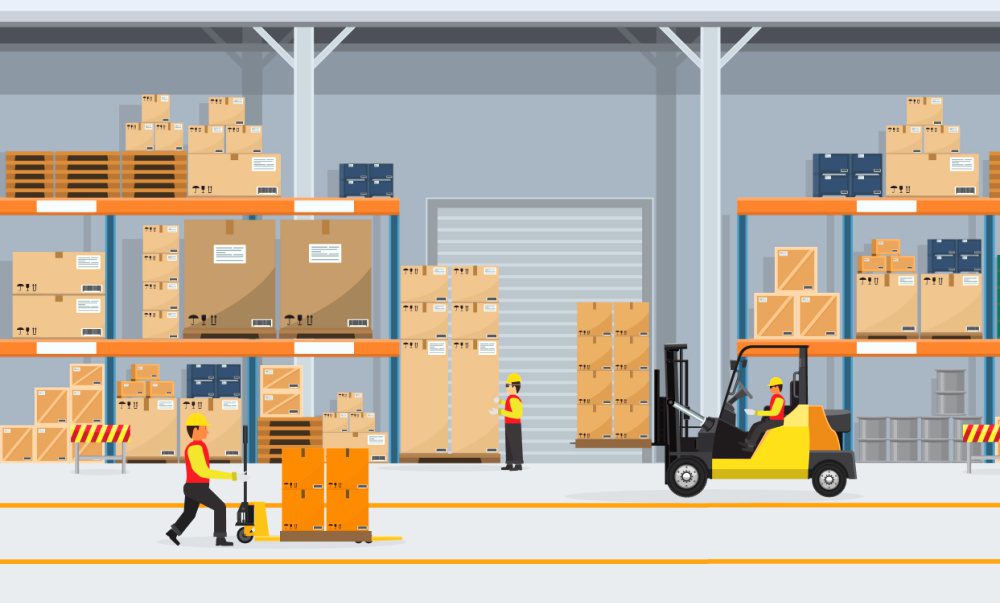Bonded warehouses are storage facilities for imported goods, where importers can store bonded goods before they’re processed by customs. A bonded warehouse is effectively a duty-free zone, as the tax won’t be payable until the goods leave the facility and enter the UK market.
Bonded goods are still accessible for sorting, repackaging, and other processing by the owner while they’re in storage. When they’re ready, they can then pay duties owed and distribute the goods for sale, or export them out of the country again without owing import taxes.
This is a beneficial system for businesses who want to streamline their cash flow, allowing them to store inventory while deferring import tax until they need to move the goods – but they’ll need to choose a bonded warehouse that’s authorised to store their goods.
There are several kinds of bonded warehouses, and while all are officially regulated by HMRC, some have different permissions than others. Here’s a quick guide to the difference between dry bonded warehouses and wet bonded warehouses, plus other types of bonded goods storage.
Wet vs dry bonded warehouses
The main difference that can affect a bonded warehouse’s ability to store your goods is whether you are importing ‘wet’ or ‘dry’ goods, and whether the facility has been approved by HMRC to hold and process that specific type of goods.
A ‘wet’ bonded warehouse can store imported alcohol, as well as other goods that are subject to excise duty, such as tobacco and fuels. So, if you want to import wine, beer, cider, or other spirits into a bonded warehouse, you must choose a facility offering wet bonded storage.
A ‘dry’ bonded warehouse can store most other general goods that are subject to customs duty and VAT, but not excise duty. Essentially, they can store almost anything other than alcohol, tobacco, and fuel – including e-commerce products, packaging, raw materials, or food and non-alcoholic drinks.
A bonded warehouse owner must be licensed by HMRC to import, store, and distribute the relevant goods before operating as a wet or dry bonded warehouse. For example, at John K. Philips, we are fully authorised to provide dry bonded warehouse services in the UK.
What are the different types of bonded warehouses?
The type of bonded warehouse doesn’t only determine what can be stored there, but also who can store imported goods there. Varying kinds of public and private bonded warehouses operate under strict rules from HMRC, including:
- Type A bonded warehouses – Public warehouse Type I, run by an authorised operator storing third party goods, where the authorised holder is responsible for the goods but the depositor is responsible for the transfer procedure.
- Type B bonded warehouses – Public warehouse Type II, run by an authorised operator storing third party goods, where the depositor is responsible for the warehouse transfer and customs procedure.
- Type C bonded warehouses – Private warehouse run by an authorised operator storing their own imports and/or those of external clients, but the warehouse administrator assumes all responsibility for goods and transfers.
- Type D/E bonded warehouses – Private warehouse run by an authorised operator storing only their own imported goods, for which the warehouse administrator is completely responsible as the sole depositor.
- Free bonded warehouses – Public warehouse where any importer can apply to store their goods, but the facility is secured and run directly by the customs authorities.
Though they’re often mentioned in the same conversations about import storage and duty deferrals, a special economic zone (SEZ) is not the same as a bonded warehouse. This type of ‘free zone’ is a larger designated geographical area next to a port, more like a whole logistics park.
What can you store in a bonded warehouse, and for how long?
Any items brought into the UK that are eligible for customs charges can be held in a bonded warehouse, deferring these charges until the goods leave the facility. These are then classed as ‘bonded goods’ because they are held by bond within the duty-free warehouse.
The goods typically have to be imported from a non-EU country, and they can be stored in the bonded warehouse while waiting for documentation or licences, or as part of a suspended duties arrangement for goods that will be re-exported. Goods from the EU can only be stored if they are eligible for a refund on export under the Common Agricultural Policy.
Of course, goods such as alcohol, tobacco, and fuel can only be stored specifically in a wet bonded warehouse. When it comes to other goods, including any stored in a dry bonded warehouse, they may also be subject to other regulations.
For example, some chemicals, medicines, and animal or plant products are considered ‘controlled goods’ with strict licensing. The bonded warehouse operator must also have the appropriate licences for storing and transporting such products, as should the depositor for importing and selling them.
While in bonded storage, importers can still access their goods to further prepare them for distribution. Otherwise, bonded goods can usually be stored for as long as the importer likes, up to at least 5 years or more (though the depositor must continue to pay for storage). Among the many benefits of bonded warehouses is the preservation of your goods in a well-located secure facility during such long-term storage.
However, some perishable goods, such as Common Agricultural Policy (CAP) products – including meat and poultry, fruits and vegetables, and fats, oils, and sugars – will have a time limit for how long they can be kept in a bonded warehouse.
Bonded storage in North West England
If you’re searching for a dry bonded warehouse in an excellent location for speedy distribution or re-exporting, look no further than John K. Philips. Our bonded warehouse in Warrington is very close to national road networks, and easily accessible for cargo arriving by air or sea via major hubs like Liverpool and Manchester.
While we cannot store wet bonded goods such as alcohol, our bonded warehouse services have the benefit of including end-to-end administration and logistics solutions if required. Many businesses find it easier to outsource the paperwork and transportation aspects to the professionals already handling their imported goods, as it’s far more efficient.
So, if you import goods into the UK that match the descriptions above for storage in a dry bonded warehouse, why not partner with John K. Philips to streamline your business operations? Your goods will be kept completely safe with customs charges suspended until you’re ready to access or move them, and our team can help you comply with the relevant regulatory procedures.
If you’re a trader of any size and this sounds like something your business could benefit from, call us on 01744 751 000 or submit an enquiry form. Our team will be glad to assist you and discuss our wide range of bonded warehousing services to find a bespoke solution that works for you.


